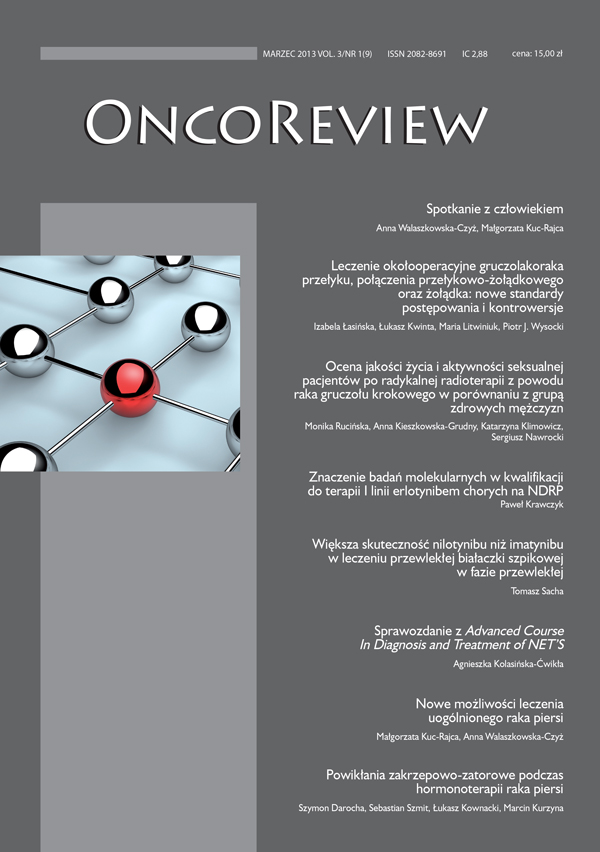Role of molecular examinations in qualification to first line treatment with erlotinib in NSCLC patients based on EUTARCstudy results Review article
Main Article Content
Abstract
Between 2010–2011 the first EGFR thyrosine kinase inhibitor (EGFR TKI) – gefitinib, was registered in many countries in I line of treatment in patients with advanced and locally advanced non-small cell lung cancer (NSCLC), among whom EGFR gene mutations have been detected. It was also found that the presence of these mutations is crucial for the effectiveness of EGFR TKI – erlotinib, used so far mainly in monotherapy in II line in NSCLC patients, with unknown EGFR gene status. Studies of these two drugs concerned mostly Asian NSCLC populations, where EGFR gene mutations occurrence is much higher than in Caucasian populations. The EURTAC study, and a study by Rosell et al. previous to it, were the first ones that confirmed the effectiveness of erlotinib in adenocarcinoma patients of Caucasian origin, who carried EGFR gene mutations: exon 19 deletions or L858R substitution in exon 21 of this gene. The innovative nature of this study is to attempt to detect EGFR gene mutations in free circulating DNA in peripheral blood, which could broaden the possibility of advanced NSCLC patients qualification to EGFR TKI treatment. The EURTAC study also has its weaknesses, among which disqualification of patients with other forms of non-squamous NSCLC (e.g. large cell carcinoma patients, who also might be carriers of EGFR gene mutations) and patients with rare EGFR gene mutations, are the most distinct.
Downloads
Article Details

This work is licensed under a Creative Commons Attribution-NonCommercial 4.0 International License.
Copyright: © Medical Education sp. z o.o. This is an Open Access article distributed under the terms of the Attribution-NonCommercial 4.0 International (CC BY-NC 4.0). License (https://creativecommons.org/licenses/by-nc/4.0/), allowing third parties to copy and redistribute the material in any medium or format and to remix, transform, and build upon the material, provided the original work is properly cited and states its license.
Address reprint requests to: Medical Education, Marcin Kuźma (marcin.kuzma@mededu.pl)
References
2. Ku G., Haaland B., de Lima Lopes G.: Gefitinib vs. chemotherapy as first-line therapy in advanced non-small cell lung cancer: meta-analysis of phase III trials. Lung Cancer 2011; 74: 469-473.
3. Petrelli F., Borgonovo K., Cabiddu M. et al.: Efficacy of EGFR tyrosine kinase inhibitors in patients with EGFR mutated non-small-cell lung cancer: a meta-analysis of 13 randomized trials. Clin. Lung Cancer 2012; 13(2): 107-14.
4. Benlloch S., Taron M., Botero M. et al.: Retrospective EGFR mutation testing of clinical specimens from the EURTAC trial of erlotinib in non-small cell lung cancer (NSCLC) using a novel allele-specific PCR (AS-PCR) assay. J. Clin. Oncol. 2012; 30(suppl.): abs. 10596.
5. Rosell R., Massuti Sureda B., Costa C. et al.: Concomitant actionable mutations and overall survival (OS) in EGFR-mutant non-small-cell lung cancer (NSCLC) patients (p) included in the EURTAC trial: EGFR L858R, EGFR T790M, TP53 R273H and EML4-ALK. European Society for Medical Oncology 2012: Abs. LBA31.
6. Rosell R., Molina-Vila M., Taron M. et al.: EGFR compound mutants and survival on erlotinib in non-small cell lung cancer (NSCLC) patients (p) in the EURTAC study. J. Clin. Oncol. 2012; 30(suppl.): abs. 7522.
7. Krawczyk P., Ramlau R., Powrózek T. et al.: Wykrywalność mutacji w genie EGFR u chorych na niedrobnokomórkowego raka płuca w wybranych ośrodkach w Polsce zaangażowanych w diagnostykę molekularną. Kardiochirurgia i Torakochirurgia Polska 2012; 9 (4): 431-438.
8. Costa E., Taron M., Queralt C. et al.: Differential progression-free survival (PFS) to erlotinib according to EGFR exon 19 deletion type in non-small cell lung cancer (NSCLC) patients (p) in the EURTAC study. J. Clin. Oncol. 2012; 30 (suppl.): abs. 7540.
9. Buges C., Marti M., Rosell R. et al.: Skin toxicity associated with outcome to erlotinib in non-small cell lung cancer (NSCLC) patients (p) with EGFR mutations in the EURTAC study. J. Clin. Oncol. 2012; 30(suppl.): abs. 7542.
10. Rosell R., Moran T., Queralt C. et al.: Spanish Lung Cancer Group. Screening for epidermal growth factor receptor mutations in lung cancer. N. Engl. J. Med. 2009; 361(10): 958-67.

